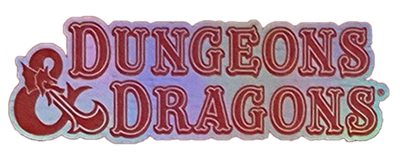Chadlupkes (talk | contribs) No edit summary |
m (+ja) |
||
| (4 intermediate revisions by 2 users not shown) | |||
| Line 1: | Line 1: | ||
| − | '''''Dungeons & Dragons''''' (abbreviated as '''''D&D''''' or '''''DnD''''') is a tabletop [[fantasy]] [[role-playing game]] (RPG) originally designed by [[Gary Gygax|E. Gary Gygax]] and [[Dave Arneson]], and first published in 1974 by the Gygax-owned company [[TSR, Inc.|Tactical Studies Rules, Inc.]] (TSR). The game is currently published by [[Wizards of the Coast]], a division of [[Hasbro]]. It was derived from [[Miniature wargaming|miniature wargames]], with a variation of the ''[[chainmail (game)|Chainmail]]'' game serving as the initial rule system.<ref |
+ | '''''Dungeons & Dragons''''' (abbreviated as '''''D&D''''' or '''''DnD''''') is a tabletop [[Wikipedia:Fantasy|fantasy]] [[role-playing game]] (RPG) originally designed by [[Gary Gygax|E. Gary Gygax]] and [[Dave Arneson]], and first published in 1974 by the Gygax-owned company [[TSR, Inc.|Tactical Studies Rules, Inc.]] (TSR). The game is currently published by [[Wizards of the Coast]], a division of [[Hasbro]]. It was derived from [[Wikipedia:Miniature wargaming|miniature wargames]], with a variation of the ''[[chainmail (game)|Chainmail]]'' game serving as the initial rule system.<ref>{{cite web| last=Birnbaum| first=Jon| title=Gary Gygax Interview| publisher=Game Banshee| url=http://www.gamebanshee.com/interviews/garygygax1.php| accessdate=Octobre 31st, 2009 | date = July 20, 2004 |
| + | }}</ref> ''D&D'''s publication is widely regarded as the beginning of modern role-playing games and, by extension, the entire role-playing game industry. |
||
| − | Players of ''D&D'' create [[Player character|characters]] that embark upon imaginary adventures within a fantasy [[setting |
+ | Players of ''D&D'' create [[Player character|characters]] that embark upon imaginary adventures within a fantasy [[Campaign setting|setting]]. A [[Dungeon Master]] (DM) serves as the game's referee and storyteller, while also maintaining the setting in which the adventures occur. During each game session, the players listen to descriptions of their character's surroundings, as well as additional information and potential choices from the DM, then describe their actions in response. The characters form a party that interacts with the setting's inhabitants (and each other). Together they solve dilemmas, engage in battles and gather treasure and knowledge.<ref>{{cite book |last1 = Williams | first1 = J. P. |last2 = Hendricks | first2 = S. Q. |last3 = Winkler | first3 = W. K. | year=2006 | title=Gaming as Culture, Essays on Reality, Identity and Experience in Fantasy Games | publisher=[[Wikipedia:Oxford University Press|Oxford University Press]] | location=McFarland & Company | isbn=0-7864-2436-2 |
| + | }}, Introduction</ref> In the process the characters earn [[experience points]] to become increasingly powerful over a series of sessions. ''D&D'' departs from traditional wargaming and assigns each player a specific [[player character|character]] to play instead of a military formation. Miniature figures or markers, placed on a grid, are sometimes used to represent these characters. |
||
| + | |||
| + | ==References== |
||
| + | <references/> |
||
[[Category:!Categories]] |
[[Category:!Categories]] |
||
| + | [[ja:ダンジョンズ&ドラゴンズ]] |
||
Revision as of 11:53, 5 January 2014
Dungeons & Dragons (abbreviated as D&D or DnD) is a tabletop fantasy role-playing game (RPG) originally designed by E. Gary Gygax and Dave Arneson, and first published in 1974 by the Gygax-owned company Tactical Studies Rules, Inc. (TSR). The game is currently published by Wizards of the Coast, a division of Hasbro. It was derived from miniature wargames, with a variation of the Chainmail game serving as the initial rule system.[1] D&D's publication is widely regarded as the beginning of modern role-playing games and, by extension, the entire role-playing game industry.
Players of D&D create characters that embark upon imaginary adventures within a fantasy setting. A Dungeon Master (DM) serves as the game's referee and storyteller, while also maintaining the setting in which the adventures occur. During each game session, the players listen to descriptions of their character's surroundings, as well as additional information and potential choices from the DM, then describe their actions in response. The characters form a party that interacts with the setting's inhabitants (and each other). Together they solve dilemmas, engage in battles and gather treasure and knowledge.[2] In the process the characters earn experience points to become increasingly powerful over a series of sessions. D&D departs from traditional wargaming and assigns each player a specific character to play instead of a military formation. Miniature figures or markers, placed on a grid, are sometimes used to represent these characters.
References
- ↑ Birnbaum, Jon (July 20, 2004). Gary Gygax Interview. Game Banshee. Retrieved on Octobre 31st, 2009.
- ↑ (2006). Gaming as Culture, Essays on Reality, Identity and Experience in Fantasy Games. (Oxford University Press), loc. McFarland & Company., Introduction
